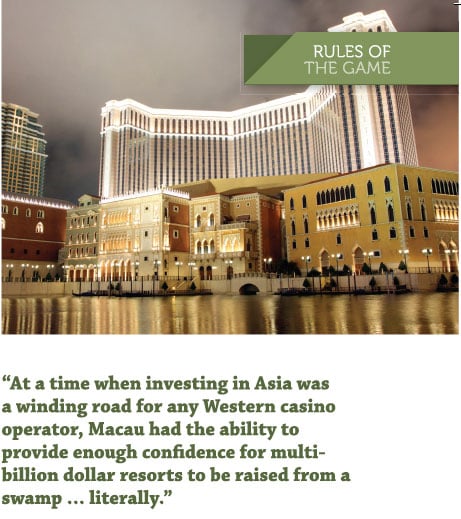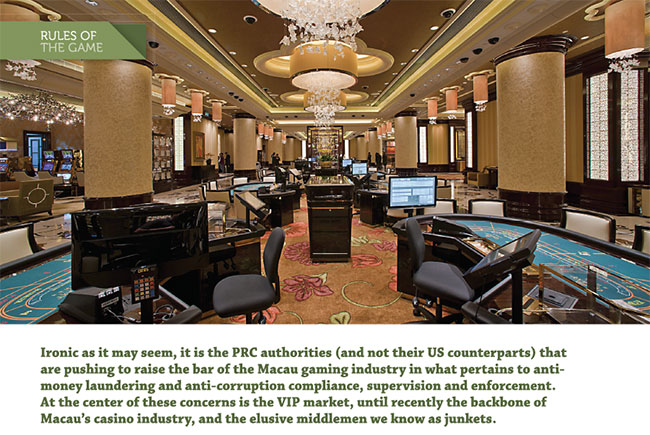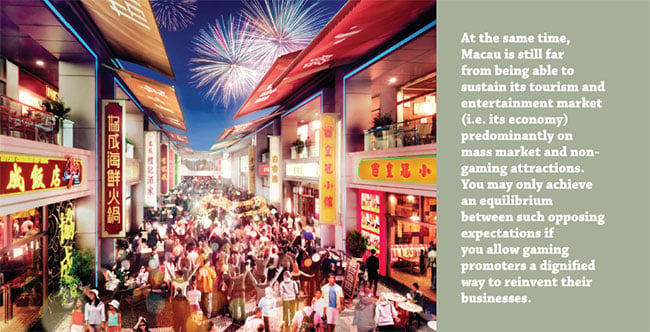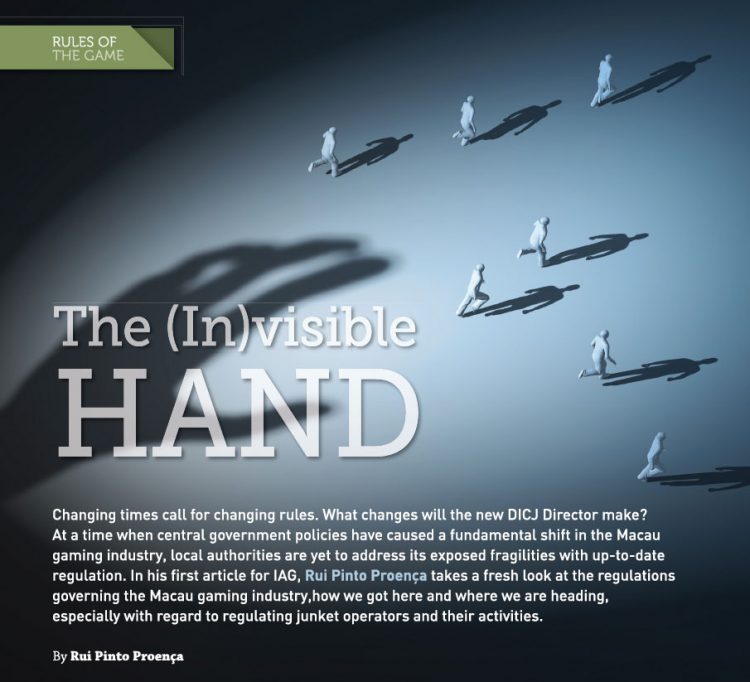To regulate is a fine art, and an unrewarding one at that. In fact, the most successful regulation is the one that goes unnoticed; that neither draws the lobbying eyes of the industry it conditions, nor the popular scrutiny of the society that it intends to benefit. When mastered, regulation can be a very powerful weapon. It may smother or foster an entire industry, but is only truly achieved when it makes us all believe that Adam Smith was indeed right – there really is an invisible hand that naturally guides the self-interested businessman towards the production of socially beneficial results. I dare to argue that even Mr Smith, often attributed with the paternity of modern laissezfaire economic policy, would agree with most governments that the gaming sector requires regulation, perhaps to a similar extent as the banking or pharmaceutical industries. The easy flow of untraceable capital, exposure of consumers to fraudulent practices and the social consequences of uncontrolled vice are just too dangerous and often too present to be left only to casino stakeholders’ mutual sympathy of sentiments.
The end goals of gaming policy are fairly common to most jurisdictions where the industry is allowed but regulated. The ways to achieve them, however, vary widely and are hardly replicable in different places or times. To this point, the regulatory strategy adopted by the Macau government in the early 2000s was, by any standard, extremely successful. The proof is right there for anyone to see: it is spelled out in its unprecedented tax revenues and employment rates and photographed in the incredible properties that generate them. At a time when investing in Asia was a winding road for any Western casino operator, Macau had the ability to provide enough confidence for multi-billion dollar resorts to be raised from a swamp … literally. Simultaneously, it was able to convince highly scrutinizing overseas regulators that its legal system – inherited from a recent political transition of a four hundred-year old administration – would not drop the core standards imposed on their operators back home. As fascinating as it may seem, Macau’s biggest achievement was that it did all that whilst giving the floor to the real stars of the show, the casino operators and the people and businesses – yes, gaming promoters included – that made it all happen.

As with most things in life, the balance in regulation, as accomplished as it may have been, is never perennial. To survive, it must adapt, often rapidly, to the ever-changing backdrop of stakeholders’ priorities and it must do so without overly disrupting what, for some, may be a very comfortable status quo. As Macau thrived on the back of those operators whose investment it attracted, it failed to convince its single most important customer – or so we all came to realize – that the practices overseas regulators accepted were good enough to keep the industry above unwanted influences. Ironic as it may seem, it is the PRC authorities (and not their US counterparts) that are pushing to raise the bar of the Macau gaming industry in what pertains to anti-money laundering and anticorruption compliance, supervision and enforcement. At the center of these concerns is the VIP market, until recently the backbone of Macau’s casino industry, and the elusive middlemen we know as junkets. For government agencies across the border the high-stakes casino play on credit just does not have a place in the corruption-free China they are relentlessly crusading for. At least not how it has been conducted by many so far.

The PRC’s central government policies, albeit not yet translated into serious regulation at an SAR level, have caused a fundamental shift in the industry, raising the mass market share to a historical high and shying away billions in VIP gaming revenues in the process. This imposed readjustment of the Macau model has exposed some of its fragilities, the latest of which re-gained the spotlight with the well publicized “Dore Case”, in which an employee of a junket operator allegedly ran away with millions in investors’ monies. As painful as it may be in the short term, the long-term general direction seems very clear, and that is good, at least for the businesses that are here to stay.
Macau is to become a world-class entertainment destination, more geared towards the resort-seeking family than to the hardcore baccarat veteran. However, for the SAR to successfully reinvent its role as a regional industry leader, the Invisible Hand of the regulator has to step away from its comfort zone and translate policy into well-thought out, well-drafted and well-enforced legislation. Nothing less is expected from the new director of the Gaming Inspection and Coordination Bureau, the government body entrusted with assisting the Macau Chief Executive in defining, coordinating and executing economic policies within the gaming industry. Mr Paulo Chan, appointed to office in early December, is a respected man of laws, having been a Public Prosecutor for almost two decades. He has a very challenging task ahead. As is often the case with reactive measures, he runs the risk of going too far, too quickly. On the other hand, being too slow in addressing industry issues may extend existing risks to the best apples of the tree.
As most sector players would agree – well managed gaming promotion operations such as Suncity and Tak Chun included – it is positive for business to step up regulation and supervision at this stage of market maturity. A more serious approach to Know Your (final) Client obligations and a more scrutinizing role at the licensing stage, amongst other measures, would contribute to cleaning the junket sector of undesirable agents, increase its reputation and, ultimately, improve the overall standards of the gaming industry. However, if the mandate is to indiscriminately push gaming promoters out of business one must prepare for a hard landing after all. For so long as China imposes restrictions on capital outflow and enforcement of markers is a matter of patience rather than one of contract, gaming promoters have an important, even if smaller, role to play.
At the same time, Macau is still far from being able to sustain its tourism and entertainment market (i.e. its economy) predominantly Rules of the game on mass market and non-gaming attractions. You may only achieve an equilibrium between such opposing expectations if you allow gaming promoters a dignified way to reinvent their businesses. This reinvention may tap into the great wealth of experience, knowledge and resources gaming promoters have amassed throughout the heydays of the VIP market and direct it to the pursuit of the desired economic diversification.
A way to start, if I may, would be to scrap that so counterproductive provision (section 4 of the Gaming Promotion Regulation – regulation 6/2002) that prevents licensed junket companies from having other companies as their shareholders. Such a provision effectively impedes the formation of proper corporate structures and thus the gaming promoters’ ability to normally access regulated financial markets. Instead they have to rely on backdoor listings of profit share interests drafted in two page agreements or to resort to expensive high interest loans from uninformed and often unknown investors. Rather than preventing, such limitation actually promotes the unfortunate events that we witnessed happening to Dore. If a more robust framework is accompanied by a real-life and transparent approach to business, then balance may be reinstated and Macau may play an even more dominant role at a regional level.
At a time when to regulate is in order, one may only imagine what Macau would look like if, from the beginning, it would have adopted regulations as prescriptive as the ones produced by jurisdictions such as Singapore or New Jersey. The hand would certainly be more visible; the gaming industry would probably not.

































